Ever had a burp that smells like rotten eggs right in the middle of a meeting or quiet moment at home?
It’s not just awkward—it could be your body signaling a bigger issue. This foul-smelling gas is called hydrogen sulfide, and when it escapes through a burp, it’s known as a sulfur burp.
Here’s the question you’re probably asking: How long do sulfur burps last?
Sometimes it’s just a few hours after eating trigger foods. But in many cases, these “rotten egg” burps can last for days—or keep coming back—especially if they’re tied to gut imbalances, food intolerances, or hidden infections.
You’re not alone in wondering how to stop them—and fast.
In this guide, you’ll learn what causes sulfur burps, how long they usually last, what home remedies actually work, and when it’s time to see a doctor.
Let’s break it down and help you find real relief.
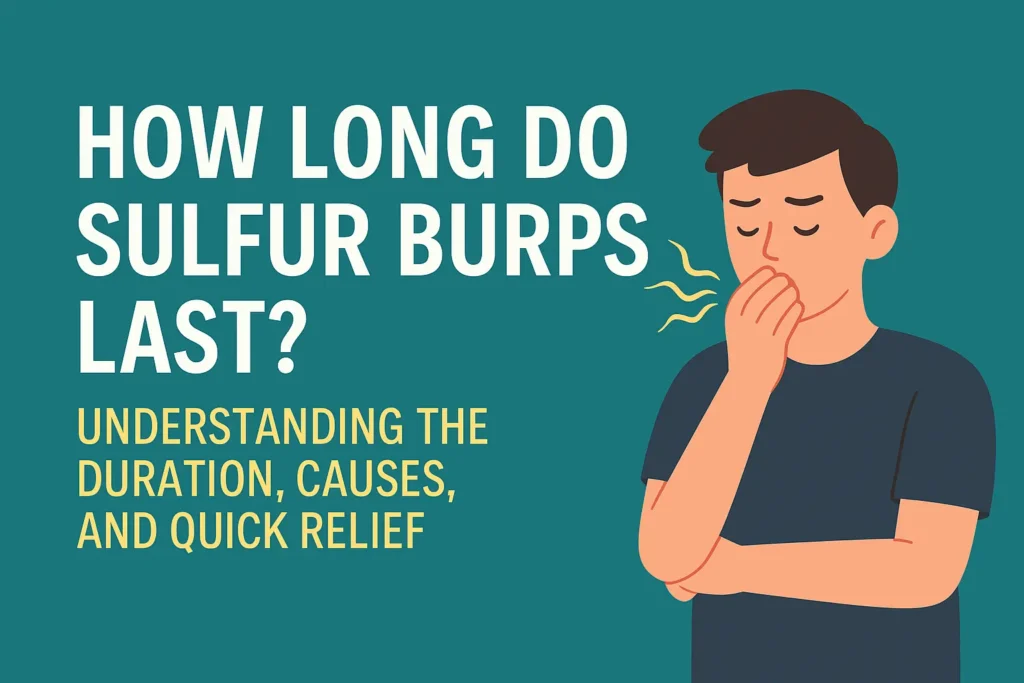
What Are Sulfur Burps and Why They Matter
Sulfur burps are burps that smell like rotten eggs, caused by the presence of hydrogen sulfide gas in your digestive system. This gas forms when certain bacteria break down sulfur-rich foods in your stomach and intestines.
While occasional burping is normal, sulfur burps that happen frequently or last longer than expected can be a red flag. They may signal poor digestion, food intolerances, or even gut infections like Helicobacter pylori (H. pylori).
Understanding what triggers these burps and how long they stick around is key to finding relief—and peace of mind.
Common Causes of Sulfur Burps
Sulfur burps are more than just a bad smell—they’re your body’s way of telling you something isn’t right. To figure out how long they’ll last, you first need to understand what’s causing them in the first place.
Here are the most common culprits:
🥦 1. Sulfur-Rich Foods
Foods like broccoli, cauliflower, brussels sprouts, garlic, onions, eggs, dairy, and red meat contain high levels of sulfur. When your body digests these, hydrogen sulfide gas can form, resulting in burps that smell like rotten eggs.
🤢 2. Digestive Upset or Food Intolerance
Mild food poisoning, overeating, or eating too quickly can trigger digestive issues that slow down your stomach. This gives bacteria more time to break down food and release sulfur gas.
Common intolerances linked to sulfur burps:
- Lactose intolerance
- Fructose malabsorption
- Gluten sensitivity
🦠 3. Bacterial Infections (H. pylori, Giardia)
Infections like Helicobacter pylori (H. pylori) or Giardia can inflame your stomach lining and mess with digestion. These bugs increase sulfur-producing bacterial activity, which leads to more gas and longer-lasting burps.
🔄 4. Gastrointestinal Disorders
Conditions like GERD, IBS, SIBO, and gastroparesis can cause recurring sulfur burps because they interfere with normal digestion and gut motility.
These issues can cause:
- Excess gas buildup
- Delayed digestion
- Imbalanced gut flora
💊 5. Medications and Supplements
Some medications—especially antibiotics, iron supplements, or protein powders—can disrupt your gut balance or slow digestion. This can lead to more fermentation and sulfur gas release.
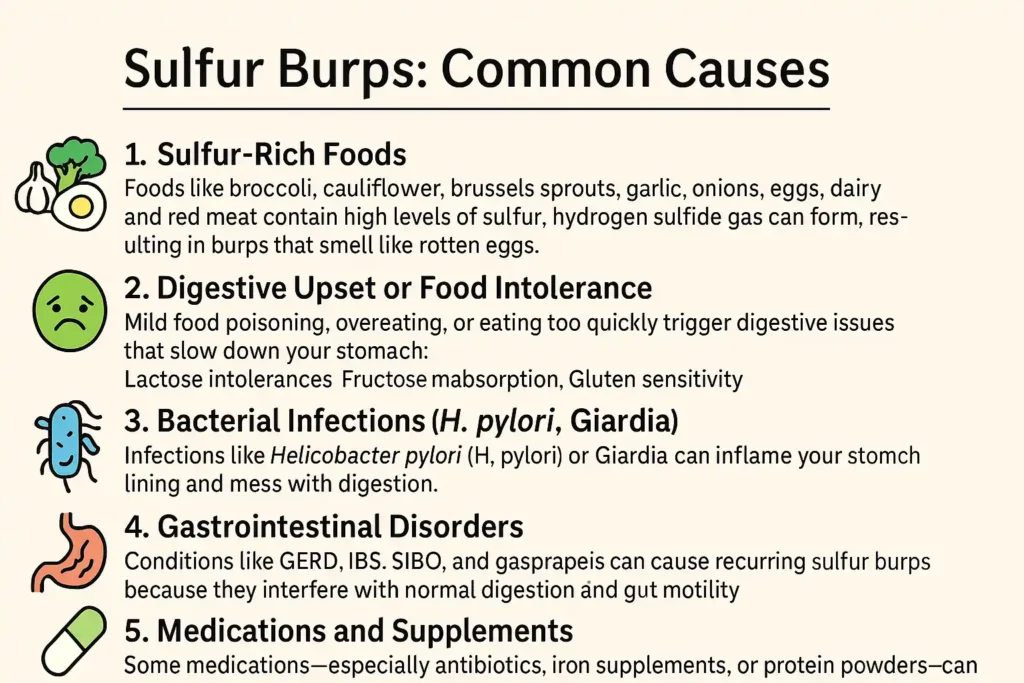
How Long Do Sulfur Burps Last? (By Cause)
So, let’s answer the question you came here for:
How long do sulfur burps last?
Well, it depends—because not all sulfur burps are created equal. Here’s a breakdown based on different causes:
🍳 1. After Eating Sulfur-Rich Foods
If you’ve just had a heavy meal with eggs, garlic, broccoli, or red meat, those burps might pop up within an hour or two and last for a few hours as your body digests the food.
✅ Typical duration: 2–6 hours
✅ Fix: Drink water, take a walk, or try peppermint tea to speed digestion.
🤷♂️ 2. Due to Mild Digestive Upset or Overeating
Had too much pizza or greasy takeout? Your digestive system might slow down, leading to sulfur burps the next day.
✅ Typical duration: 6–48 hours
✅ Fix: Try lighter meals, warm water with lemon, or ginger tea.
🦠 3. Caused by Infections (e.g., H. pylori or Giardia)
Bacterial or parasitic infections interfere with your stomach’s balance, often leading to sulfur burps that last for days or even weeks—especially if untreated.
✅ Typical duration: Several days to weeks
❗ Fix: You may need antibiotics or anti-parasitic meds—see a doctor.
💢 4. Chronic Digestive Conditions (GERD, IBS, SIBO)
If you’re dealing with a long-term condition like GERD or IBS, sulfur burps can become recurring or chronic.
✅ Typical pattern: Ongoing or recurring (flare-ups)
✅ Fix: Work with your doctor to manage your condition. Diet tracking and probiotics may help.
🧀 5. Food Intolerances (Lactose, Gluten, etc.)
Every time you eat something your body can’t process well (like dairy if you’re lactose intolerant), sulfur burps might appear.
✅ Typical duration: Up to 24 hours after eating trigger food
✅ Fix: Keep a food journal. Identify and eliminate the trigger.
🚽 6. Accompanied by Diarrhea or Stomach Upset
If sulfur burps come with diarrhea or nausea, it’s likely a short-term infection or food poisoning.
✅ Typical duration: 2–7 days depending on severity and treatment
❗ Fix: Stay hydrated, rest, and eat bland foods. If it lasts more than 3 days, get medical help.
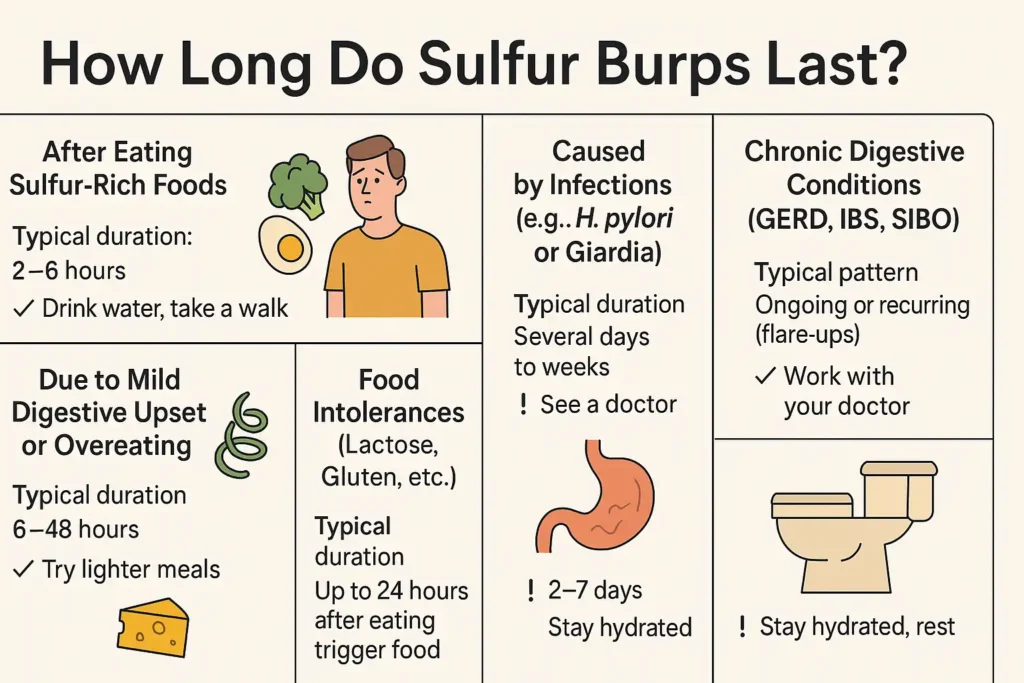
🧠 Quick Tip:
Persistent sulfur burps for more than 3–5 days could be a sign of something more serious. Don’t ignore them—listen to your gut (literally!).
Why Sulfur Burps Come Back or Linger
You thought they were gone… but here come those nasty sulfur burps again. So, what’s making them stick around or keep coming back?
Here are the top reasons why sulfur burps become a recurring problem:
🍽️ 1. You’re Still Eating Trigger Foods
Even healthy foods like eggs, broccoli, onions, garlic, or dairy can cause sulfur burps if your body doesn’t tolerate them well. If you keep consuming them without adjusting your diet, you’ll keep triggering the cycle.
✅ Solution: Track your meals using a food journal to identify what’s causing the gas.
🦠 2. Unresolved Infections or Digestive Conditions
If you have H. pylori, Giardia, or GERD that hasn’t been properly diagnosed or treated, those sulfur burps won’t go away on their own.
✅ Solution: Seek a medical evaluation to get proper testing and treatment.
🧬 3. Poor Gut Health (Imbalance of Bacteria)
An unhealthy gut means too much bad bacteria and not enough good bacteria. This imbalance can lead to excessive hydrogen sulfide production.
✅ Solution: Add probiotics to your routine—like kefir, yogurt, or fermented veggies.
😰 4. Stress and Anxiety
You might not realize it, but stress can really mess with your digestion. It slows everything down, leading to gas buildup and—you guessed it—rotten egg burps.
✅ Solution: Try deep breathing, light exercise, or mindfulness techniques.
💊 5. Certain Medications or Supplements
Some supplements, especially iron pills, protein powders, or even antibiotics, can upset your stomach and promote sulfur gas production.
✅ Solution: Talk to your doctor about adjusting dosages or switching products.
🚱 6. Dehydration
Not drinking enough water can slow down digestion and create an environment where sulfur-producing bacteria thrive.
✅ Solution: Sip water throughout the day—especially after meals.
Remember: If you want sulfur burps to go away for good, you have to find and fix the root cause. Otherwise, you’ll keep dealing with the same uncomfortable symptoms.
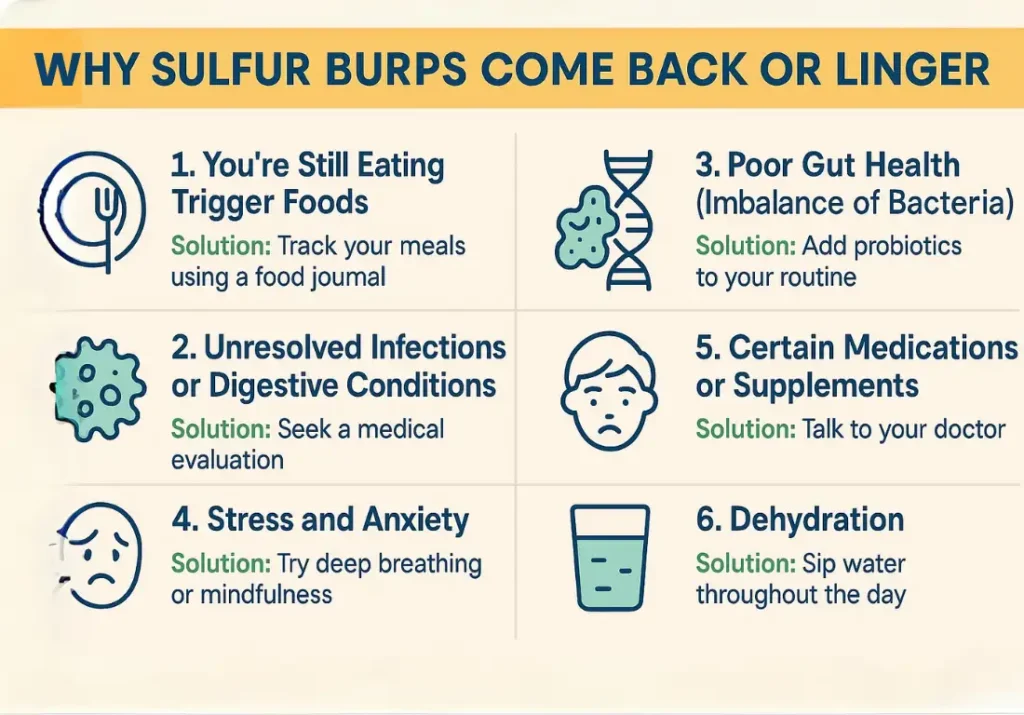
Proven Remedies for Quick Relief
When sulfur burps hit, you want them gone—fast. While treating the root cause is key for long-term relief, these proven remedies can help you feel better right now.
Here are 7 science-backed and user-loved methods for quick relief:
☕ 1. Peppermint Tea
Peppermint has a calming effect on your stomach muscles and helps move gas through your digestive system.
✅ How to use: Sip a warm cup after meals. Avoid if you have acid reflux, as it may relax the lower esophageal sphincter.
🌿 2. Ginger Tea or Ginger Chews
Ginger is a natural anti-inflammatory that helps with bloating, gas, and nausea.
✅ How to use: Grate fresh ginger into hot water or chew on natural ginger candies.
🥤 3. Warm Water with Lemon
Lemon water can stimulate digestion and help your body flush out toxins that contribute to gas buildup.
✅ How to use: Squeeze half a lemon into a cup of warm water and drink in the morning.
🧪 4. Baking Soda Water (Neutralizes Acid)
Baking soda is alkaline and can help neutralize excess stomach acid that may be contributing to your sulfur burps.
✅ How to use: Mix ½ teaspoon in a glass of water and sip slowly. Avoid overuse.
🍎 5. Apple Cider Vinegar (ACV)
ACV may help balance stomach acid levels and support digestion, especially in people with low stomach acid.
✅ How to use: Mix 1 tablespoon in a glass of water before meals. Choose unfiltered, organic ACV.
💊 6. Activated Charcoal
Known as a “gas sponge,” activated charcoal binds to toxins and gas in your digestive tract to reduce odor.
✅ How to use: Take activated charcoal supplements as directed. Not for long-term use or for those on medication (can interfere with absorption).
🧫 7. Probiotics
Probiotics help restore the balance of good bacteria in your gut, especially after antibiotics, poor diet, or infections.
✅ How to use: Eat probiotic-rich foods like yogurt, kefir, kimchi, sauerkraut, or take a quality supplement.
💡 Bonus Tips:
- Stay hydrated to flush your system
- Chew food thoroughly to ease digestion
- Avoid carbonated drinks and sugary foods that increase gas production
While these remedies offer temporary relief, remember that long-term healing depends on addressing the underlying cause of your sulfur burps.
When to Seek Medical Attention
While home remedies can help with occasional sulfur burps, sometimes it’s more than just a diet issue. If the symptoms stick around or come with other problems, it’s time to get checked out.
Here are the signs you should not ignore:
🚨 1. Sulfur Burps That Last More Than a Few Days
If your sulfur burps linger for more than 3–5 days, it could mean there’s an infection, a chronic digestive condition, or another underlying issue at play.
🤢 2. Nausea, Vomiting, or Diarrhea
These symptoms may point to food poisoning, Giardia, or H. pylori—all of which require medical treatment.
✅ Important: If you also have a fever or bloody stool, seek urgent care.
⚖️ 3. Unexplained Weight Loss or Fatigue
If you’re losing weight without trying or constantly feel drained, your body might not be absorbing nutrients properly—a sign of SIBO, Crohn’s disease, or even stomach cancer in rare cases.
💧 4. Signs of Dehydration
Frequent diarrhea or vomiting paired with sulfur burps can quickly lead to dehydration, especially in children and older adults.
Watch for:
- Dry mouth
- Dark urine
- Dizziness or weakness
🔥 5. Frequent Heartburn or Acid Reflux
If you’re burping up sulfur and also dealing with chest pain, regurgitation, or a sour taste, this could indicate GERD or another acid-related disorder.
📞 When in Doubt, Call a Doctor
If your sulfur burps come back often or make daily life uncomfortable, don’t wait. A healthcare provider can:
- Run tests like a stool analysis, endoscopy, or breath test
- Diagnose infections like H. pylori
- Recommend treatment plans or refer you to a gastroenterologist
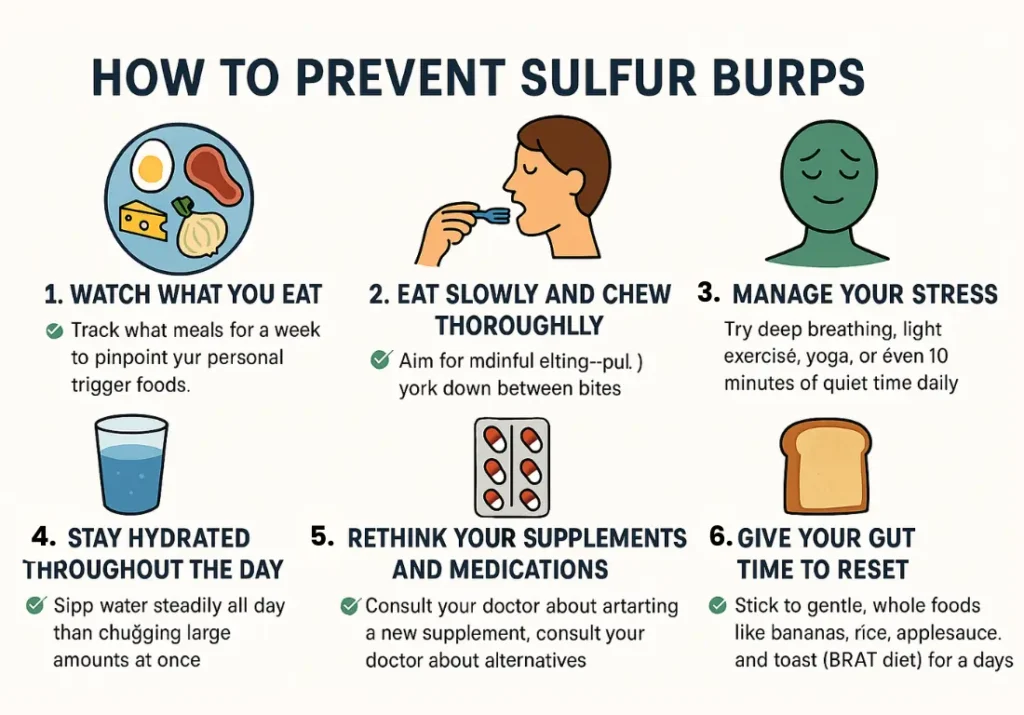
Expert Tips to Prevent Sulfur Burps
You don’t have to live in fear of that rotten egg surprise. The good news is, sulfur burps are often preventable with just a few simple lifestyle changes.
Here’s what experts recommend:
🥗 1. Watch What You Eat
Some foods are high in sulfur and more likely to trigger gas during digestion. These include:
- Eggs
- Red meat
- Dairy products
- Onions and garlic
- Cruciferous veggies (broccoli, cauliflower, brussels sprouts)
✅ Tip: Track your meals for a week to pinpoint your personal trigger foods.
🍽️ 2. Eat Slowly and Chew Thoroughly
Rushing through meals or not chewing enough leads to swallowed air, poor digestion, and gas buildup.
✅ Tip: Aim for mindful eating—put your fork down between bites.
💧 3. Stay Hydrated Throughout the Day
Water helps your digestive system function smoothly and flushes out toxins that could ferment in your gut.
✅ Tip: Sip water steadily all day rather than chugging large amounts at once.
😌 4. Manage Your Stress
Chronic stress can trigger digestive issues like IBS and GERD, which in turn can lead to sulfur burps.
✅ Tip: Try deep breathing, light exercise, yoga, or even 10 minutes of quiet time daily.
🧫 5. Take Probiotics for Gut Health
Probiotics balance the bacteria in your gut, helping reduce gas and improve digestion.
✅ Tip: Add probiotic-rich foods like yogurt, kefir, sauerkraut, or try a supplement with Lactobacillus and Bifidobacterium strains.
💊 6. Rethink Your Supplements and Medications
Some people react poorly to iron tablets, protein powders, or antibiotics, which can mess with your gut.
✅ Tip: If sulfur burps start after starting a new supplement, consult your doctor about alternatives.
💤 7. Give Your Gut Time to Reset
After illness or antibiotic use, your gut bacteria need time and support to rebuild.
✅ Tip: Stick to gentle, whole foods like bananas, rice, applesauce, and toast (BRAT diet) for a few days.
Preventing sulfur burps is all about gut maintenance—feed your digestive system well, keep stress low, and listen to your body’s signals.
Conclusion
Sulfur burps may be embarrassing—and sometimes alarming—but they’re also your body’s way of waving a red flag.
So, how long do sulfur burps last?
It depends. They might clear up in just a few hours after eating certain foods… or linger for days (even weeks) if something deeper is going on, like an infection or chronic digestive condition.
🗝️ Key Takeaways:
- Most cases resolve within a few hours to 48 hours with home care.
- Persistent sulfur burps often point to infections (H. pylori, Giardia) or chronic issues (GERD, IBS, SIBO).
- You can reduce and prevent symptoms by:
- Avoiding trigger foods
- Eating slowly and staying hydrated
- Using gentle natural remedies
- Improving your gut health with probiotics
- Don’t ignore it if symptoms last longer than 5 days or come with severe issues like vomiting, diarrhea, or weight loss—see a doctor.
🌿 Relief Is Possible
With a bit of observation, some lifestyle tweaks, and maybe a doctor’s help, you can take control of your gut health and say goodbye to sulfur burps for good.
If you found this article helpful, share it with a friend or bookmark it for next time your stomach speaks up.
Got questions? Drop them in the comments or talk to a trusted healthcare provider.
FAQs
What are sulfur burps?
Sulfur burps are burps that smell like rotten eggs. They’re caused by hydrogen sulfide gas forming in your stomach during digestion—often due to bacteria breaking down sulfur-rich foods like eggs or garlic.
Is it normal to have sulfur burps after eating?
Yes, occasional sulfur burps after eating high-sulfur foods are common and usually harmless. However, if they happen frequently or come with other symptoms, it may signal a digestive issue.
How can I get rid of sulfur burps instantly?
Fast relief may come from drinking peppermint tea, warm lemon water, or a baking soda mixture. Activated charcoal may also help, but it’s for short-term use only. Avoid trigger foods and stay hydrated.
What home remedies work for sulfur burps?
Try peppermint tea, ginger root, apple cider vinegar in water, baking soda water, or probiotic-rich foods like yogurt. These may support digestion and reduce sulfur gas buildup.
How can I stop sulfur burps from coming back?
Avoid known trigger foods, treat any underlying digestive infections, manage stress, and take probiotics. Long-term relief often comes from identifying root causes and adjusting your diet.
Does peppermint tea help with sulfur burps?
Yes, peppermint tea can relax digestive muscles and help gas pass more easily, offering short-term relief. It’s one of the most commonly recommended natural remedies for sulfur burps.
When should I see a doctor about sulfur burps?
See a doctor if sulfur burps last more than 5 days, return frequently, or come with symptoms like nausea, diarrhea, weight loss, or abdominal pain. These could signal a more serious condition.
Are sulfur burps a sign of infection?
They can be. Infections like H. pylori or Giardia often cause sulfur burps along with diarrhea, cramping, or nausea. A medical test may be needed to confirm the cause and begin treatment.
Can sulfur burps be caused by medications like Ozempic or Mounjaro?
Yes, some medications—especially GLP-1 drugs like Ozempic and Mounjaro—can slow digestion, leading to sulfur burps as food sits longer in the stomach and ferments.
Why are sulfur burps so embarrassing?
Because of their foul, rotten egg smell, sulfur burps often cause embarrassment in social settings. Many people report avoiding gatherings or isolating themselves during episodes.
Can stress or anxiety cause sulfur burps?
Yes, stress can affect digestion, slow gut motility, and alter gut bacteria—factors that may contribute to sulfur burps. Mindful eating and relaxation techniques can help reduce symptoms.
Do sulfur burps mean I have GERD?
Not necessarily. While GERD can cause sulfur burps due to acid reflux, other issues like diet, infections, or SIBO may also be responsible. A diagnosis should be made by a healthcare provider.
Do sulfur burps always mean something is wrong?
No. Occasional sulfur burps—especially after eating sulfur-rich foods—are usually harmless. But frequent or persistent episodes may indicate an underlying condition that needs attention.

